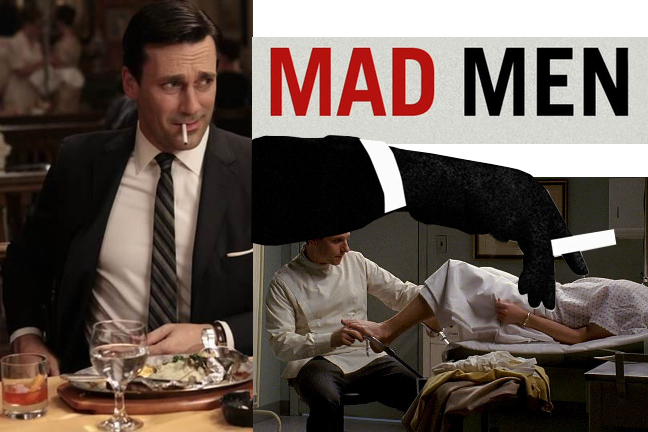Cool Anxiety by Pat Conrad MD
Hooray, after a long year away, this last Sunday night saw the return of “Mad Men”, and yes, I’m a huge fan of Don Draper’s booze-soaked capitalism, the era’s space age cool, and I could write a whole week on Joan Holloway. (Focus, dammit, this is Authentic Medicine!)
Oh yeah. Anyway, the beginning of Season 6 was yet another foray into a run of cultural archetypes fading into syndication. Five years before, the office manager escorts the new girl to a special doctor, one who smokes in the exam room and does pelvic exams without a chaperone. This doc is one known to prescribe these new pills, FDA-approved for “menstrual disorders”, for a more recreational purpose, albeit off-label, warning her against being “a strumpet”, saying, “I’ll take you off this medicine if you abuse it…it’s for your own good, really.” Of course, the bombshell office manager brags with a giggle that she had seen (wink) the doctor’s vacation home. I miss the days of such elegant paternalism.
As the show wanders through the early and mid sixties, we are treated to more of our stylized forbears: one doc diagnoses our hero with hypertension, treats him with reserpine and phenobarbital, and prescribes him to relax: “buy a boat.” (the patient misses the boat but does relax, with a little scotch for flavor and road rash). The central character hires a psychiatrist for his neurotic wife, and pays him damn good money to call him secretly in the dead of night with reports on how the wife is progressing. Hey, Hippocrates never had to make a mortgage. There is the uncomfortable waiting in the out-of-state doctor’s office for unmarried ladies who need a discreet procedure; the glaring white nurse hats bustling past the soda machines while the office waits for news of an amputated foot, adding this gem: “The doctor said he’ll never golf again.” When model-turned-matron Betty goes to the doc for diet pills, he first empties his pipe, and then buries his head in the chart while muttering “with middle-aged women it gets easier to put it on and harder to take it off.” The internists for the most part are dour, with a laconic manner that might lend itself better to that forthcoming Age of EHR, but they get off light enough. In the first five seasons, the representative surgeon actually doesn’t get a residency slot, and switches to psychiatry; rapes his fiancée, who later brains him with a vase, which in turn encourages him to join the army and head off to Vietnam. He is dark, entitled, and let’s the competitive forces crack his insecurities into an angular self-parody through which the writers present the rigors of medical training in those days before the ACGME mandated 80-hour/week limit.
Those that made it through are like the surgeon in the latest episode. He opens the show by performing life-saving CPR on his bellman, and glad-handing his way through life with his neglected wife. The final scene is a tony yet utterly banal Manhattan New Year’s Eve party, tacky with fondue swinger-suggestiveness and Galliano. A call arrives – the surgeon must go. His wife goes through the obligatory protestation, and then retreats to rote. As the surgeon is putting on skis (seriously) to get to the mid-town hospital, the ad man has a smoke. The surgeon skis off, and the ad man beds the surgeon’s wife.
Even a period piece reflects its contemporary culture, and Mad Men is no exception. Their portrayals of physicians are usually over the top caricatures – a tipsy surgeon skiing through Manhattan to get to an emergency? Was there really no one else on call? But the pitfalls of work-as-identity ring true, as does the surgeon’s final observation to the ad man: “Honestly Don, the whole life and death thing, doesn’t bother me…Guys like us that’s why we get paid – you get paid to think about things they don’t want to think about and I get paid not to think about them. People will do anything to alleviate their anxiety.” Grappling with that, I believe, is still the heart of authentic medicine.









